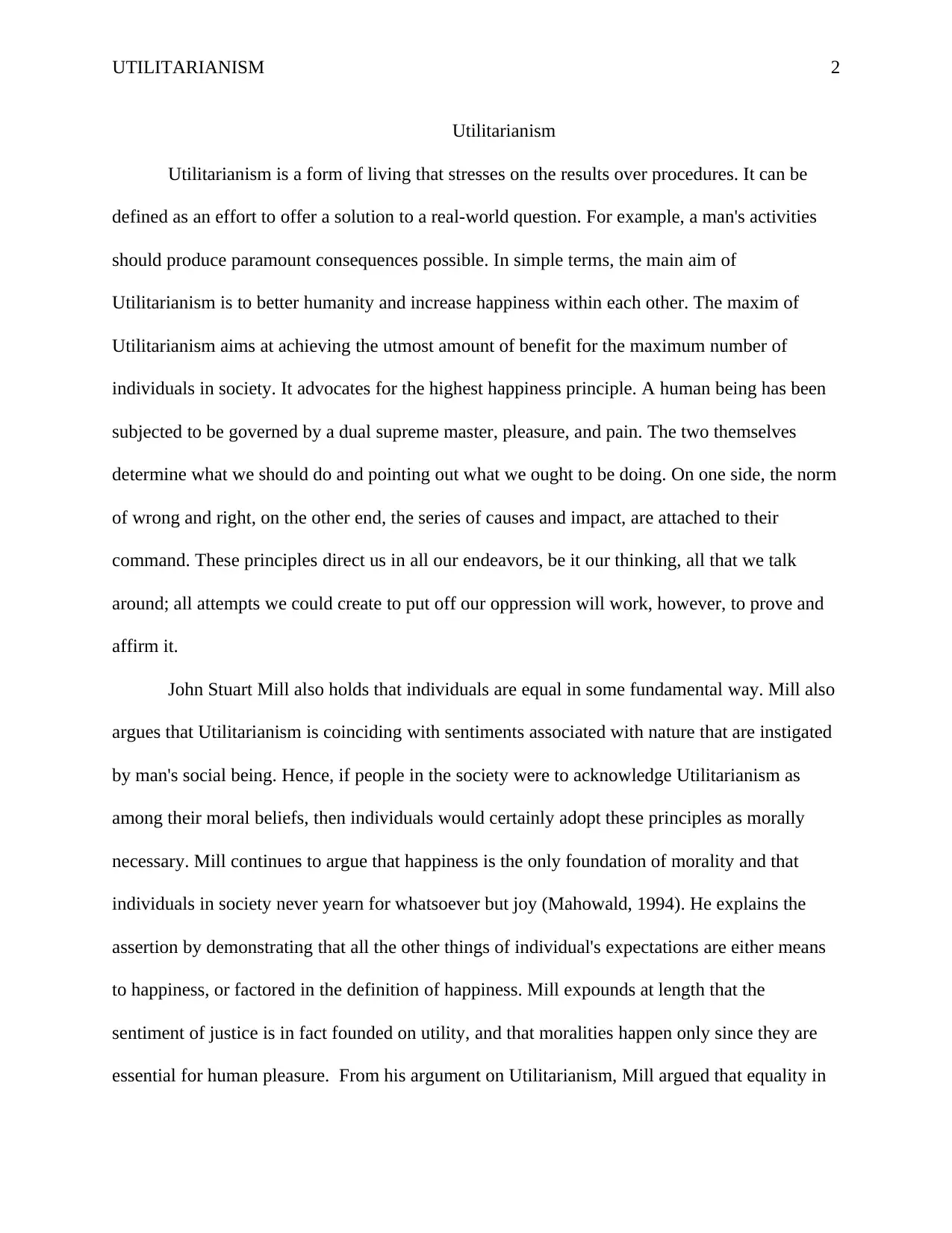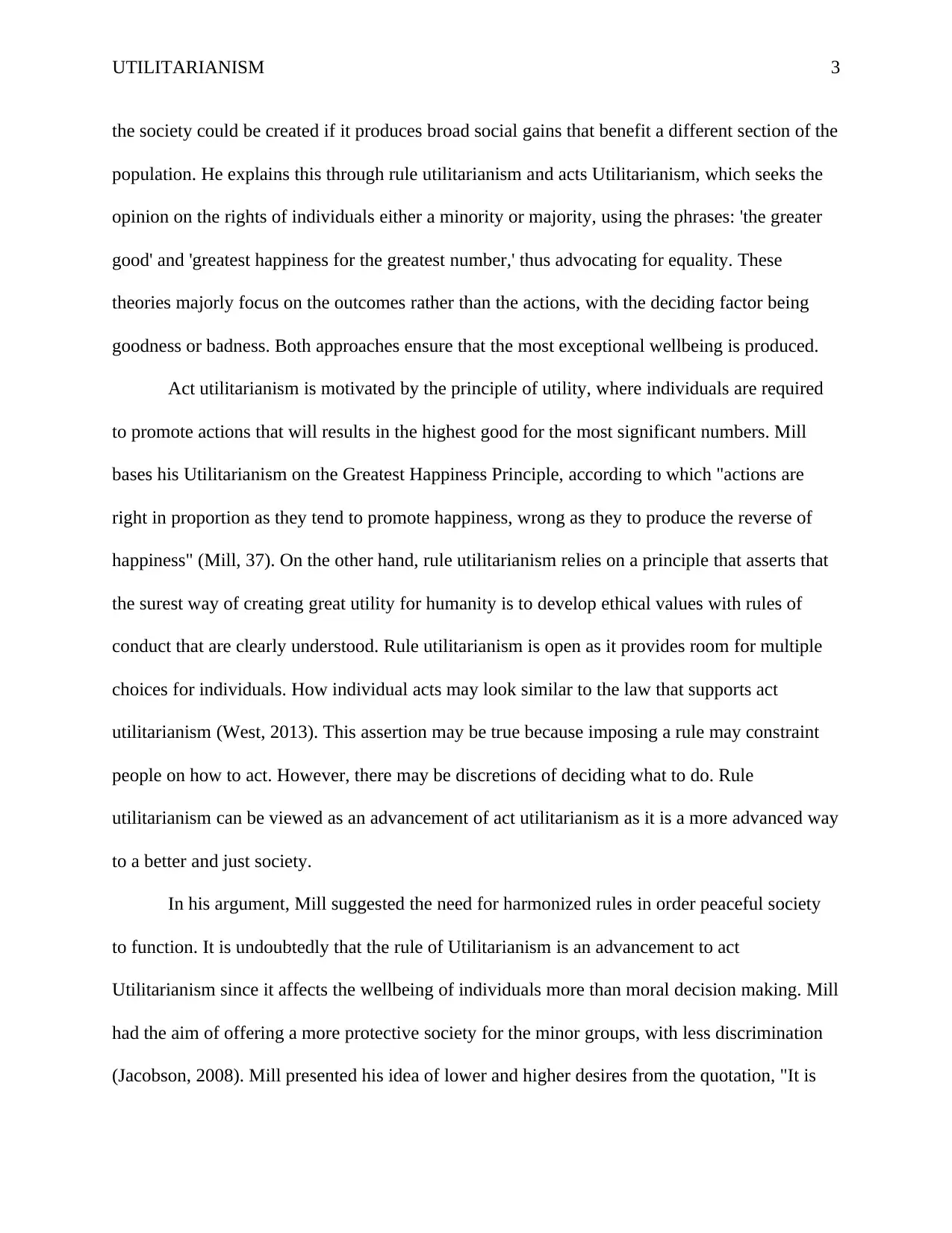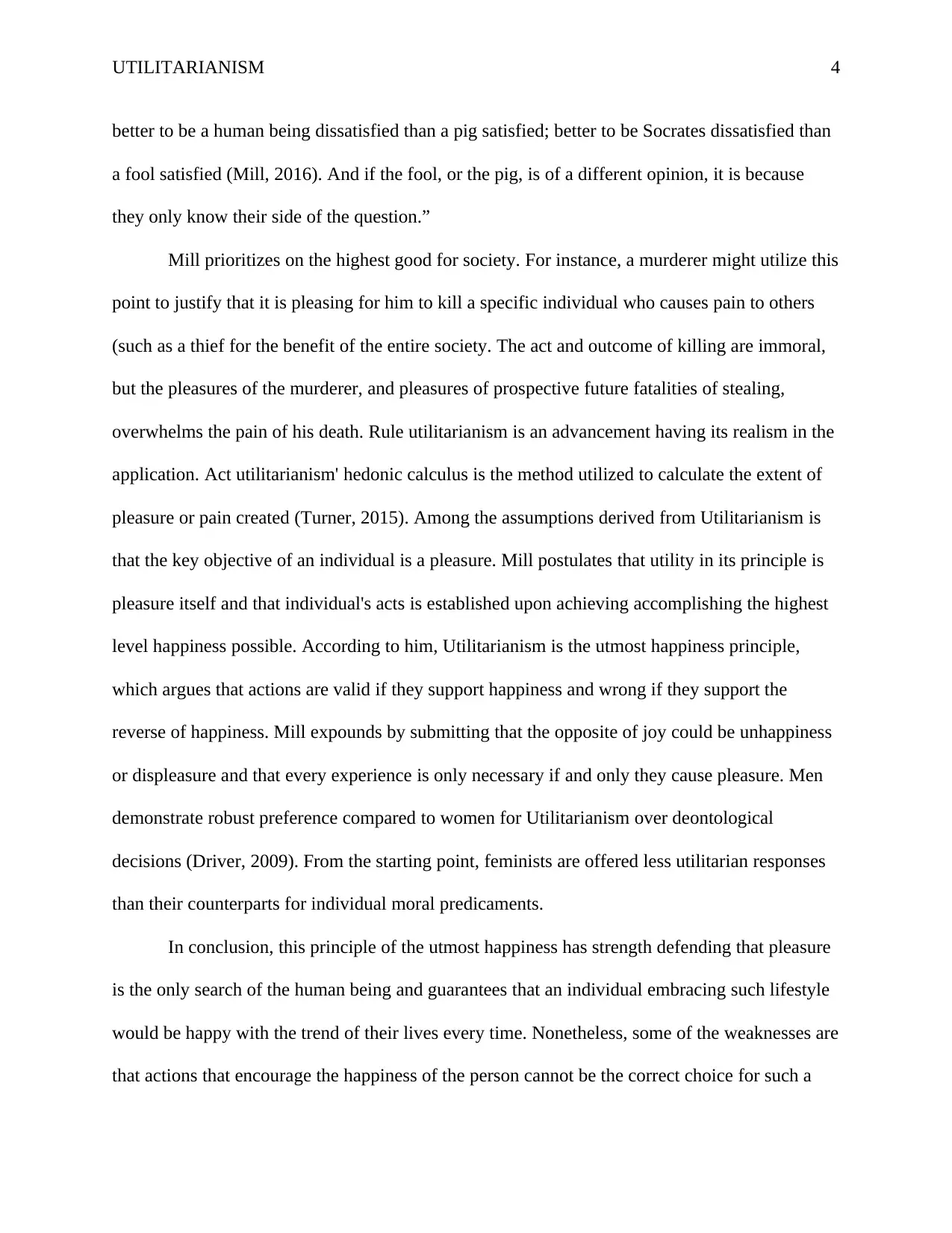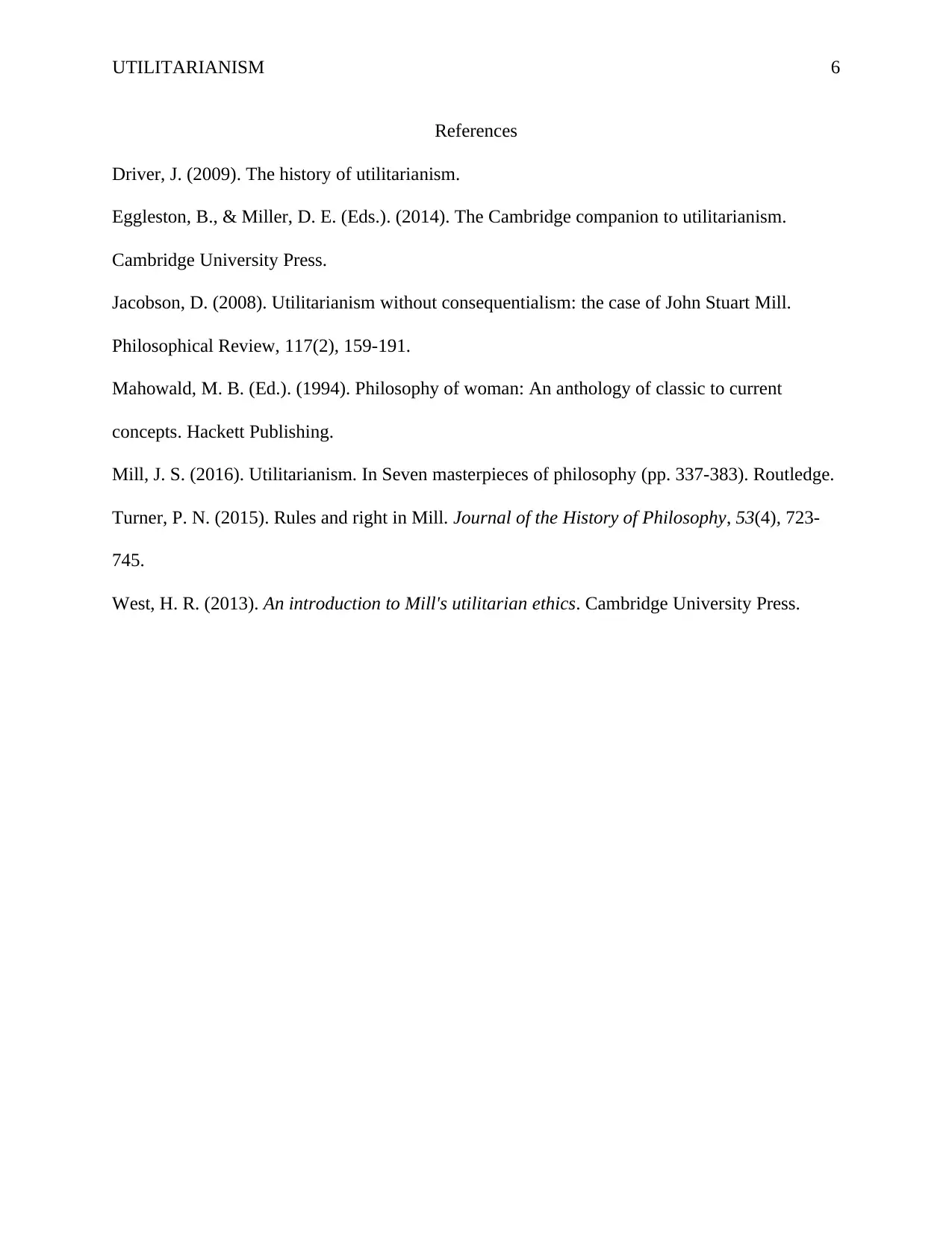Utilitarianism: Examining Core Principles and Contemporary Relevance
VerifiedAdded on 2022/08/29
|6
|1350
|22
Essay
AI Summary
This essay delves into the philosophical concept of utilitarianism, exploring its core principles and various theories. It defines utilitarianism as a consequentialist approach that prioritizes outcomes over procedures, aiming to maximize overall happiness and benefit for the greatest number of people. The essay examines the views of John Stuart Mill, highlighting his contributions to utilitarian thought, including the Greatest Happiness Principle and the distinction between act and rule utilitarianism. It discusses how Mill believed in the equality of individuals and the role of happiness as the foundation of morality. The essay further analyzes the differences between act and rule utilitarianism, focusing on their approaches to decision-making and their implications for societal well-being. It also touches upon the weaknesses of utilitarianism, such as the potential for actions that promote individual happiness not always aligning with the best choices, and the need to consider external factors. The essay concludes by emphasizing the importance of utilitarianism's focus on maximizing happiness while acknowledging its limitations.

Running head: UTILITARIANISM
Utilitarianism
Institution:
Name:
Date:
Utilitarianism
Institution:
Name:
Date:
Paraphrase This Document
Need a fresh take? Get an instant paraphrase of this document with our AI Paraphraser

UTILITARIANISM 2
Utilitarianism
Utilitarianism is a form of living that stresses on the results over procedures. It can be
defined as an effort to offer a solution to a real-world question. For example, a man's activities
should produce paramount consequences possible. In simple terms, the main aim of
Utilitarianism is to better humanity and increase happiness within each other. The maxim of
Utilitarianism aims at achieving the utmost amount of benefit for the maximum number of
individuals in society. It advocates for the highest happiness principle. A human being has been
subjected to be governed by a dual supreme master, pleasure, and pain. The two themselves
determine what we should do and pointing out what we ought to be doing. On one side, the norm
of wrong and right, on the other end, the series of causes and impact, are attached to their
command. These principles direct us in all our endeavors, be it our thinking, all that we talk
around; all attempts we could create to put off our oppression will work, however, to prove and
affirm it.
John Stuart Mill also holds that individuals are equal in some fundamental way. Mill also
argues that Utilitarianism is coinciding with sentiments associated with nature that are instigated
by man's social being. Hence, if people in the society were to acknowledge Utilitarianism as
among their moral beliefs, then individuals would certainly adopt these principles as morally
necessary. Mill continues to argue that happiness is the only foundation of morality and that
individuals in society never yearn for whatsoever but joy (Mahowald, 1994). He explains the
assertion by demonstrating that all the other things of individual's expectations are either means
to happiness, or factored in the definition of happiness. Mill expounds at length that the
sentiment of justice is in fact founded on utility, and that moralities happen only since they are
essential for human pleasure. From his argument on Utilitarianism, Mill argued that equality in
Utilitarianism
Utilitarianism is a form of living that stresses on the results over procedures. It can be
defined as an effort to offer a solution to a real-world question. For example, a man's activities
should produce paramount consequences possible. In simple terms, the main aim of
Utilitarianism is to better humanity and increase happiness within each other. The maxim of
Utilitarianism aims at achieving the utmost amount of benefit for the maximum number of
individuals in society. It advocates for the highest happiness principle. A human being has been
subjected to be governed by a dual supreme master, pleasure, and pain. The two themselves
determine what we should do and pointing out what we ought to be doing. On one side, the norm
of wrong and right, on the other end, the series of causes and impact, are attached to their
command. These principles direct us in all our endeavors, be it our thinking, all that we talk
around; all attempts we could create to put off our oppression will work, however, to prove and
affirm it.
John Stuart Mill also holds that individuals are equal in some fundamental way. Mill also
argues that Utilitarianism is coinciding with sentiments associated with nature that are instigated
by man's social being. Hence, if people in the society were to acknowledge Utilitarianism as
among their moral beliefs, then individuals would certainly adopt these principles as morally
necessary. Mill continues to argue that happiness is the only foundation of morality and that
individuals in society never yearn for whatsoever but joy (Mahowald, 1994). He explains the
assertion by demonstrating that all the other things of individual's expectations are either means
to happiness, or factored in the definition of happiness. Mill expounds at length that the
sentiment of justice is in fact founded on utility, and that moralities happen only since they are
essential for human pleasure. From his argument on Utilitarianism, Mill argued that equality in

UTILITARIANISM 3
the society could be created if it produces broad social gains that benefit a different section of the
population. He explains this through rule utilitarianism and acts Utilitarianism, which seeks the
opinion on the rights of individuals either a minority or majority, using the phrases: 'the greater
good' and 'greatest happiness for the greatest number,' thus advocating for equality. These
theories majorly focus on the outcomes rather than the actions, with the deciding factor being
goodness or badness. Both approaches ensure that the most exceptional wellbeing is produced.
Act utilitarianism is motivated by the principle of utility, where individuals are required
to promote actions that will results in the highest good for the most significant numbers. Mill
bases his Utilitarianism on the Greatest Happiness Principle, according to which "actions are
right in proportion as they tend to promote happiness, wrong as they to produce the reverse of
happiness" (Mill, 37). On the other hand, rule utilitarianism relies on a principle that asserts that
the surest way of creating great utility for humanity is to develop ethical values with rules of
conduct that are clearly understood. Rule utilitarianism is open as it provides room for multiple
choices for individuals. How individual acts may look similar to the law that supports act
utilitarianism (West, 2013). This assertion may be true because imposing a rule may constraint
people on how to act. However, there may be discretions of deciding what to do. Rule
utilitarianism can be viewed as an advancement of act utilitarianism as it is a more advanced way
to a better and just society.
In his argument, Mill suggested the need for harmonized rules in order peaceful society
to function. It is undoubtedly that the rule of Utilitarianism is an advancement to act
Utilitarianism since it affects the wellbeing of individuals more than moral decision making. Mill
had the aim of offering a more protective society for the minor groups, with less discrimination
(Jacobson, 2008). Mill presented his idea of lower and higher desires from the quotation, "It is
the society could be created if it produces broad social gains that benefit a different section of the
population. He explains this through rule utilitarianism and acts Utilitarianism, which seeks the
opinion on the rights of individuals either a minority or majority, using the phrases: 'the greater
good' and 'greatest happiness for the greatest number,' thus advocating for equality. These
theories majorly focus on the outcomes rather than the actions, with the deciding factor being
goodness or badness. Both approaches ensure that the most exceptional wellbeing is produced.
Act utilitarianism is motivated by the principle of utility, where individuals are required
to promote actions that will results in the highest good for the most significant numbers. Mill
bases his Utilitarianism on the Greatest Happiness Principle, according to which "actions are
right in proportion as they tend to promote happiness, wrong as they to produce the reverse of
happiness" (Mill, 37). On the other hand, rule utilitarianism relies on a principle that asserts that
the surest way of creating great utility for humanity is to develop ethical values with rules of
conduct that are clearly understood. Rule utilitarianism is open as it provides room for multiple
choices for individuals. How individual acts may look similar to the law that supports act
utilitarianism (West, 2013). This assertion may be true because imposing a rule may constraint
people on how to act. However, there may be discretions of deciding what to do. Rule
utilitarianism can be viewed as an advancement of act utilitarianism as it is a more advanced way
to a better and just society.
In his argument, Mill suggested the need for harmonized rules in order peaceful society
to function. It is undoubtedly that the rule of Utilitarianism is an advancement to act
Utilitarianism since it affects the wellbeing of individuals more than moral decision making. Mill
had the aim of offering a more protective society for the minor groups, with less discrimination
(Jacobson, 2008). Mill presented his idea of lower and higher desires from the quotation, "It is
⊘ This is a preview!⊘
Do you want full access?
Subscribe today to unlock all pages.

Trusted by 1+ million students worldwide

UTILITARIANISM 4
better to be a human being dissatisfied than a pig satisfied; better to be Socrates dissatisfied than
a fool satisfied (Mill, 2016). And if the fool, or the pig, is of a different opinion, it is because
they only know their side of the question.”
Mill prioritizes on the highest good for society. For instance, a murderer might utilize this
point to justify that it is pleasing for him to kill a specific individual who causes pain to others
(such as a thief for the benefit of the entire society. The act and outcome of killing are immoral,
but the pleasures of the murderer, and pleasures of prospective future fatalities of stealing,
overwhelms the pain of his death. Rule utilitarianism is an advancement having its realism in the
application. Act utilitarianism' hedonic calculus is the method utilized to calculate the extent of
pleasure or pain created (Turner, 2015). Among the assumptions derived from Utilitarianism is
that the key objective of an individual is a pleasure. Mill postulates that utility in its principle is
pleasure itself and that individual's acts is established upon achieving accomplishing the highest
level happiness possible. According to him, Utilitarianism is the utmost happiness principle,
which argues that actions are valid if they support happiness and wrong if they support the
reverse of happiness. Mill expounds by submitting that the opposite of joy could be unhappiness
or displeasure and that every experience is only necessary if and only they cause pleasure. Men
demonstrate robust preference compared to women for Utilitarianism over deontological
decisions (Driver, 2009). From the starting point, feminists are offered less utilitarian responses
than their counterparts for individual moral predicaments.
In conclusion, this principle of the utmost happiness has strength defending that pleasure
is the only search of the human being and guarantees that an individual embracing such lifestyle
would be happy with the trend of their lives every time. Nonetheless, some of the weaknesses are
that actions that encourage the happiness of the person cannot be the correct choice for such a
better to be a human being dissatisfied than a pig satisfied; better to be Socrates dissatisfied than
a fool satisfied (Mill, 2016). And if the fool, or the pig, is of a different opinion, it is because
they only know their side of the question.”
Mill prioritizes on the highest good for society. For instance, a murderer might utilize this
point to justify that it is pleasing for him to kill a specific individual who causes pain to others
(such as a thief for the benefit of the entire society. The act and outcome of killing are immoral,
but the pleasures of the murderer, and pleasures of prospective future fatalities of stealing,
overwhelms the pain of his death. Rule utilitarianism is an advancement having its realism in the
application. Act utilitarianism' hedonic calculus is the method utilized to calculate the extent of
pleasure or pain created (Turner, 2015). Among the assumptions derived from Utilitarianism is
that the key objective of an individual is a pleasure. Mill postulates that utility in its principle is
pleasure itself and that individual's acts is established upon achieving accomplishing the highest
level happiness possible. According to him, Utilitarianism is the utmost happiness principle,
which argues that actions are valid if they support happiness and wrong if they support the
reverse of happiness. Mill expounds by submitting that the opposite of joy could be unhappiness
or displeasure and that every experience is only necessary if and only they cause pleasure. Men
demonstrate robust preference compared to women for Utilitarianism over deontological
decisions (Driver, 2009). From the starting point, feminists are offered less utilitarian responses
than their counterparts for individual moral predicaments.
In conclusion, this principle of the utmost happiness has strength defending that pleasure
is the only search of the human being and guarantees that an individual embracing such lifestyle
would be happy with the trend of their lives every time. Nonetheless, some of the weaknesses are
that actions that encourage the happiness of the person cannot be the correct choice for such a
Paraphrase This Document
Need a fresh take? Get an instant paraphrase of this document with our AI Paraphraser

UTILITARIANISM 5
person at that level in time (Eggleston & Miller, 2014). An individual ought to take external
aspects like demands in school or the workplace and applications from an essential other, for
instance, before any action is taken to realize personal happiness.
person at that level in time (Eggleston & Miller, 2014). An individual ought to take external
aspects like demands in school or the workplace and applications from an essential other, for
instance, before any action is taken to realize personal happiness.

UTILITARIANISM 6
References
Driver, J. (2009). The history of utilitarianism.
Eggleston, B., & Miller, D. E. (Eds.). (2014). The Cambridge companion to utilitarianism.
Cambridge University Press.
Jacobson, D. (2008). Utilitarianism without consequentialism: the case of John Stuart Mill.
Philosophical Review, 117(2), 159-191.
Mahowald, M. B. (Ed.). (1994). Philosophy of woman: An anthology of classic to current
concepts. Hackett Publishing.
Mill, J. S. (2016). Utilitarianism. In Seven masterpieces of philosophy (pp. 337-383). Routledge.
Turner, P. N. (2015). Rules and right in Mill. Journal of the History of Philosophy, 53(4), 723-
745.
West, H. R. (2013). An introduction to Mill's utilitarian ethics. Cambridge University Press.
References
Driver, J. (2009). The history of utilitarianism.
Eggleston, B., & Miller, D. E. (Eds.). (2014). The Cambridge companion to utilitarianism.
Cambridge University Press.
Jacobson, D. (2008). Utilitarianism without consequentialism: the case of John Stuart Mill.
Philosophical Review, 117(2), 159-191.
Mahowald, M. B. (Ed.). (1994). Philosophy of woman: An anthology of classic to current
concepts. Hackett Publishing.
Mill, J. S. (2016). Utilitarianism. In Seven masterpieces of philosophy (pp. 337-383). Routledge.
Turner, P. N. (2015). Rules and right in Mill. Journal of the History of Philosophy, 53(4), 723-
745.
West, H. R. (2013). An introduction to Mill's utilitarian ethics. Cambridge University Press.
⊘ This is a preview!⊘
Do you want full access?
Subscribe today to unlock all pages.

Trusted by 1+ million students worldwide
1 out of 6
Related Documents
Your All-in-One AI-Powered Toolkit for Academic Success.
+13062052269
info@desklib.com
Available 24*7 on WhatsApp / Email
![[object Object]](/_next/static/media/star-bottom.7253800d.svg)
Unlock your academic potential
Copyright © 2020–2026 A2Z Services. All Rights Reserved. Developed and managed by ZUCOL.





